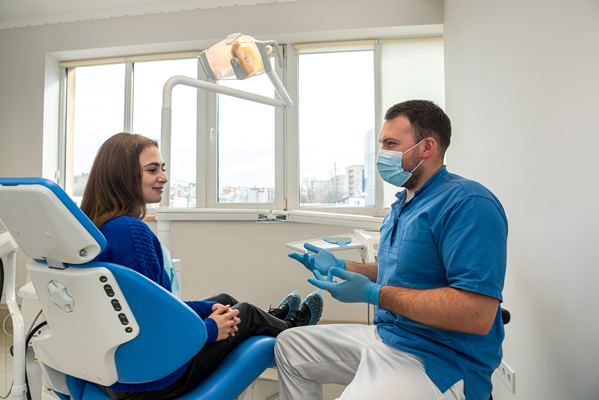What Happens During a Dental Filling Procedure?

There is no need to panic if you have just found out you have a cavity; the most common treatment approach is to undergo a dental filling procedure. Dental fillings materials can be made from resin, ionomers, gold, amalgam, or ceramics and are used to replace decaying tooth material during the filling process.
The dental fillings procedure
Although it may seem intimidating, tooth cavity filling is a straightforward operation that is completed in the dental office. Patients who have an appointment can expect their meeting with the dentist to last for about an hour, depending on the number of teeth that require a filling. The dentist will have enough time to take x-rays, discuss the details of the procedure and conduct the procedure in this period.
Application of local anesthesia
To reduce discomfort, the dentist will numb the patient's gums, teeth, and adjacent skin with a local anesthetic before beginning the cavity filling procedure. They will accomplish this by applying a jelly-like material to the teeth and the surrounding area. This will cause numbness, and then anesthesia will be administered into the gum of the damaged tooth. Patients who struggle with dental anxiety can talk to the general dentist about sedation options to make their dental visit more pleasant.
Placement of a rubber dam
A rubber sheet may be placed in the mouth by the dentist in certain cases to provide simple access to the damaged tooth. It also isolates the tooth and prevents fluids or tooth chips from entering the mouth and getting ingested.
Eliminating the decay
After that, the dentist will use a laser, drill, or air abrasion instrument to remove the decaying material in the tooth. This step may seem frightening and terrible, but the anesthetics and numbing used at the beginning will greatly lessen the discomfort. The dentist will clean the region thoroughly when the tooth is completely free of decay.
Filling the cavity
A gap is left once the decaying material is removed from the tooth. At this point, the dentist will fill the gap using dental filling materials. This is to prevent germs from forming in the region and to protect the tooth from further decay. Once the cavity is filled, the dentist will smoothen the tooth to restore its shape and luster. This process only takes a few minutes.
The numbness in the mouth will last for a few hours after the dentist completes the filling process until the anesthetic wears off. To avoid injury, avoid chewing with the treated tooth or consuming hot foods at that time. It is important to remember that the filled tooth may be sensitive to cold and heat for a few days or a week following the procedure. The sensitivity will usually go away eventually.
In conclusion
Although dental filling procedures usually have no substantial risks, you should contact your dentist if you have any questions or worries. They will be happy to attend to your concerns. Make sure you follow the dentist's instructions to the letter. If you suspect you might have cavities, book an appointment today.
Request an appointment here: https://lancasterpadentist.com or call G.J. Palmieri, DDS & Associates, LLC at (717) 708-9010 for an appointment in our Lancaster office.
Check out what others are saying about our dental services on Yelp: Composite Fillings in Lancaster, PA.
Recent Posts
Are you getting a dental filling in the near future? Dental fillings are needed to restore teeth that are in bad shape. The procedure itself is very common and a lot of people rely on it to improve their oral health.With all dental procedures comes the question of whether or not pain will be involved.…
Wondering why a dental fillings is also known as a direct dental restoration? There are both direct and indirect restoration options available, with each option addressing a particular dental problem. Examples of indirect options include dental crowns, dental bridges, dental veneers and dental implants, as these types of restorations are constructed outside of the mouth.…
The general rule is that people visit their dentist in Lancaster twice yearly for a checkup, deep cleaning and oral screening. The visit also presents a chance to be proactive by asking questions related to oral health, recommended treatments and concerns about cosmetic treatments.It is helpful to make a list of questions before going to…
Visiting a cosmetic dentist is the first step to transforming the appearance of the smile through personalized dental services. While cosmetic improvements are the primary focus, consultations often begin with a thorough evaluation of oral health to ensure a solid foundation for lasting results. Understanding how to prepare for this appointment not only improves communication…


